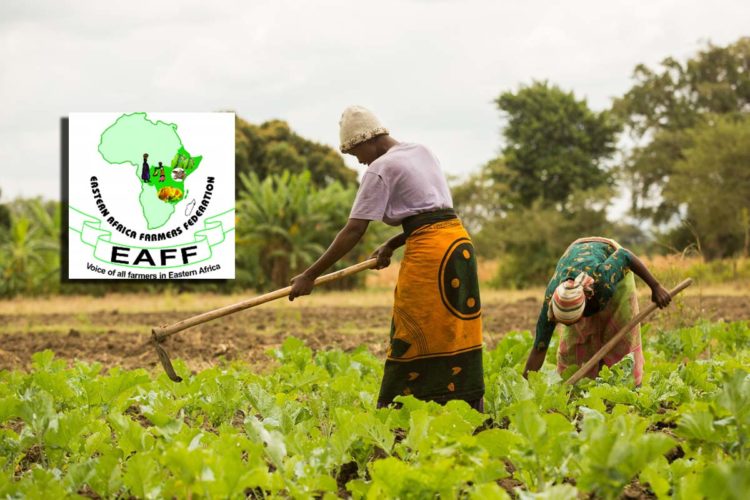For 20 million farmers in eastern and central Africa, the Eastern Africa Farmers Federation is their collective voice. Registered in Kenya, the Eastern Africa Farmers Federation (EAFF) is a members-based regional farmer’s organization founded in 2001. It was created to represent, lobby, and advocate for Eastern African farmers’ interests and to build their capacities.
EAFF membership comprises 24 national farmers’ federations, co-operatives, and commodity associations in 10 countries: Kenya, Uganda, Tanzania (Zanzibar), Rwanda, Burundi, Ethiopia, Djibouti, Democratic Republic of Congo, South Sudan and Eritrea. To be part of the EAFF, a farmers’ organization must be legally registered with a national focus.
Elizabeth Nsimadala is the regional president of EAFF, based in Nairobi, Kenya. She says the journey of EAFF in its formative years began with looking at what value the institution was going to bring to the agricultural sector and relevant stakeholders. Their foundational strategic plan (2008-2012) focused on building partnerships, being relevant in the policy space, and strengthening the foundation of representation. She says, “This we achieved with great success because we were able to build formal regional partnerships across the value chains with governments, private sector, research institutions, other regional farmer organizations and NGOs.”
They have also contributed to policy in several important themes, including: climate change, genetically modified organisms (GMOs), renewable energy, land rights (and land grabs), and food security, among others. To accomplish this, EAFF representatives participated in global meetings such as the Climate change COP (Conference of pParties), FAO (Food and Agriculture Organizations) food security committee, GFAR (Global Forum for Agriculture Research), IFAD (International Fund for Agricultural Development) farmer forum, African Union Commission, United Nations Economic Commission for Africa, and African Green Revolution Forum, among others.
Since its inception, their membership has grown from five to 10 countries, and from seven to 23 national organizations. Ms. Nsimadala says that during this period, EAFF was able to significantly take its place as the “voice of farmers” in Eastern Africa region and as a result was able to attract many development partners to support their strategic plan.
Now, their strategic plan focuses on the sustainability of the organization. Ms. Nsimadala says this means that EAFF will work at building on the current good will of members and partners to develop a platform for sustainability.
She says that the organizations realized that they need a strategy where they can generate enough funding to support the organization and its growth with less reliance on external donors.
Like any other organization, there are some challenges facing EAFF and its members, including dwindling funding to support the transformation of farmer organizations into sustainable farmer led agribusinesses, as well as limited private funding to farmers and their organizations. There is a need to increase investment in
In the East Africa region, trade and agriculture policies could be more comprehensive and cohesive to benefit farmers.
Finally, the impact of climate change and fragile states, including in Burundi, Democratic Republic of Congo, and South Sudan, cannot be ignored.
EAFF is currently working on several projects, including e-Granary – a digital library aimed at providing access to information technology and library services in developing countries. They are also working on rural youth and finance projects. As a farmers’ organization, they have a dual role in promoting the recognition of family farming and smallholders’ rights, and providing services to their members so that they can better engage in their value chains.
The EAFF believes that family farmers contribute to the environment, economy, and society. They contribute to food security, the maintenance of ecosystems and rural landscapes, the preservation of biodiversity, cultural heritage and the socio-economic foundation of rural communities. These themes are all well-anchored in the declaration of the UN Decade of Family Farming.
Capacity building and sharing information among members is important, and the EAFF relies on a few strategies. Ms. Nsimadala explains, “We also have a well-elaborated extension service that comprises publication and dissemination of educational materials to our members that are shared in manuals, brochures, and pamphlets. We also conduct radio programs on topical issues in various local language and we have an e-extension through which farmers receive integrated out bound calls and SMS through our e-Granary (mobile SMS based) platform.”
Ms. Nsimadala says they use the same platforms to collect feedback from farmers. They also use a call centre (through inbound voice calls) to conduct regular quick surveys to assess the situation in different countries and we have annual membership satisfaction survey.
“We are satisfied with the progress so far and our members have expressed satisfaction with EAFF interventions that support them in various areas, be it advocacy, agribusiness, institutional development, etc,” says Ms. Nsimadala.
_________
Story written by Busi Ngcebetsha
Ms Elizabeth Nsimadala can be contacted via email on [email protected] or phone +254 204 45 16 91. For more information please visit https://www.eaffu.org

